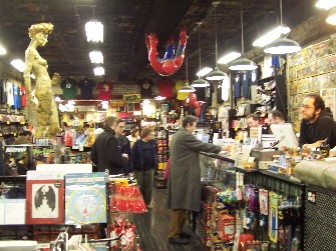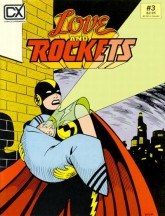
September 10, 2007
 CR Commentary: Why Comic Shops Still Matter, Or At Least Why They Should
CR Commentary: Why Comic Shops Still Matter, Or At Least Why They Should

 By Tom Spurgeon
By Tom Spurgeon
It may be a sign of Fall and the traditional lull between the summer convention crush and the Christmas book release bonanza, but there seems to have been more talk than usual lately about one of comics culture's favorite subjects, the comic book shop. Now, when I say "talk," I include dialog that frequently makes itself known via a mixture of yelling, name-calling, sloganeering and posturing. Scratch the surface of any devoted comics fan and you'll find a series of strong opinions about what comic shops should be doing better and what they should stop doing immediately. It's a volatile subject for a lot of people.
A recent anecdote about an unsatisfactory trip into a comic shop by industry stalwart Eric Reynolds noted by the popular comics blog The Beat led to louder than necessary defenses of the comic shop in question, ad-hoc lectures on proper industry conduct and outreach, summary dismissals of the vast majority of funny book shops nationwide, and accusations of arrogance and ignorance on all sides.

I love comic shops. As much as I enjoyed as a kid pedaling to Ross Supermarket or Marsh or Klink's and accosting their spinner rack, as much as the feel of turning one with a couple of fingers hooked over a thick, coated wire made of metal with a slight flick of the wrist is a sense memory as strong as any I maintain, it's the comic shop that cemented my childhood fascination with the form and enabled me to remain a reader into my teen and adult years by allowing me access to comics that appealed to me at whatever age I happened to be. I am of that lucky generation of readers that saw comics transform itself from the inside out after the undergrounds fell to the wayside, a slow and sadly never completed process that nonetheless produced a series of prominent, talked-about comics that met my needs and nurtured my reading habits from age 12 to 21, that helped me connect my passion for comic books with my sturdier but more casual interest in cartoonists like
Crockett Johnson and
Jules Feiffer by giving me access to cartoonists of similar sensibility and artistic outlook. I owe comic shops my relationship to a great International art form that has enriched my life.
That's one of the reasons why I'm always a little bit astonished when people go after comic shops in nasty, summarily dismissive fashion. Most of these criticisms in recent years come brandishing like a club the success that manga (as a category), arts comics (with a few breakout hits and an overall buttressing of the bottom line book to book), and even mainstream comics (mostly related to movies, perennials, and a few event type titles, some tied into their "universes" and some not) have enjoyed with increased opportunities in bookstores. There are definitely ways in which the success of certain titles in bookstores have changed the way we think of comic shops, cuffing to the pavement a lot of items of conventional wisdom that dominated comics discussion a scant ten years ago. We know now that comic shops are not an idealized reflection of mass culture that accurately yield sales success on exactly the level and proportion that individual comics deserve. We're cognizant that a shop's desire to back and sell something plays a much bigger role in the kind of success they'll have with certain kinds of books than we ever realized it did. We've come to the realization that kids will read comics that interest them that they can find and access in a way that they enjoy -- you can even flip them around and introduce an entirely new set of iconographic shortcuts and narrative rules. Who would have guessed? Almost nobody on the comics Internet in 1996.
(Conventional wisdom can flip around the other way, too. The effective piece of late '90s rhetoric that independent comics represented the true mainstream while superhero comics represented little more than a fetish parade and emotional comfort food favored by
30-something, loveless mega-fatties is a lot harder to argue after
a few billion dollars in superhero movies and
a 2007 Fall Network TV schedule that looks like it was slapped together by my local university's gaming club hopped up on Mountain Dew.)
I think the mistake that people well-meaning and those less well-meaning make often comes in the strength of the argumentation. It may be a reflection of on-line culture. You certainly get more people to read and react when you post "Comic Shops Need To Die" as opposed to something more
Horace Wimp-y along the lines of "Do Comic Shops Need To Change And If So, How Might They Do So?" While I'm sympathetic to hammer-and-tongs rhetoric because the major players are stridently resistant to self-reflection and reform, I think it institutes a stronger-than-usual middle finger reaction to the suggestions made. It also forces the argument into a not very helpful apportionment of blame, and all the defensiveness that comes with it. The result is that there are times when people so strongly push for a comic shop's right to do whatever the hell it wants that it's not hard to imagine someone someday soon going so far as to defend the actions of one of the players in the recent rash of retailer-related crime stories out of some misguided notion of commercial freedom.
Let me put the idea out there that the state of the comic shop is worth talking over, and worth being critical about, not because they suck but because the comic shop is currently and can remain a beneficial component to the sustained growth of the industry and art form. Comic shops can enable readers and support devotees. Their basic business arrangement's consequence in allowing low-capital entry into the market via non-returnability has been a boon to the serviced art form equaled by no other medium in the last 30 years, and that can continue. They can carry a much wider and more extensive array of work across genres and artist by artist than more generalist brick-and-mortar structures, and can facilitate a much more effective pool of commercial expertise accessed by readers face to face and over a long period of time than nearly any other place that sells such work. It's not
the market, and all arguments constructed around notions that the comic shop is owed fealty or special consideration by simply being a comic shop should be tossed into the toilet and flushed. But it is
a market, a valuable one, one that allows and should continue to allow nearly every publisher to have a deeper catalog, a market that allows hundreds and hundreds of creators a better living than would be available to them were they not there, and a business model that keeps work before an audience in a sustained, perennial fashion that many art forms can only dream about.
Once you look at comic shops as valuable and worth talking about as opposed to a backwards evil to be shoved aside and ridiculed, I think it makes for a better departure point for criticism. And yes, that's necessary, too. It should be obvious that the system can and should be criticized, although I'm not sure that's always done on the most fruitful grounds. The two biggest problems facing the Direct Market have little to do with some notion of quality and a failure of will from certain shops to achieve this, but instead 1) that the system does not do enough to encourage and support the best models for sustained success, and 2) the system does not do enough to keep itself from being manipulated and exploited for the sake of gains different than or even opposed to sustained, long-term success.
In other words, I think that the shortcomings in the Direct Market are systemic ones, which necessitate systemic solutions. The problem with the DM isn't that there's a bunch of crappy shops, but that the system doesn't encourage reform of the type that improves shops, or encourage the best ones in a way proportional to how well they succeed. It should probably be expected that companies are going to have goals like short-term profit and manipulating the market for competitive advantage in order to appease stockholders or corporate overlords, but comics may be unique in its tendency to support year after year of abuse/neglect and even high-five the people involved for what they're able to score by working the system. That could stop. All of us who are active in comics, from reader to editors-in-chief, should insist on strategies that support ethical, sustained growth for every market out there, including the DM. It's the healthiest way to act, and there should be enough adults out there to keep the ship pointed in that direction, or at least express with eloquence and determination what's wrong about the latest attempt to hijack an industry and art form's development to squeeze a few more bucks from its skeevier elements.

So rather than all the time folks spend bloviating over a shop's right not to sell stuff it doesn't want to sell, the argument should be on strategies and ways that a shop that wants to can access and have success with all the markets that are available to it, and, further, to encourage more accounts that
want to engage with the art form in successful, universally beneficial ways. No one should have to argue the value of diversity beyond pointing at how well the prominent, diverse shops out there survived the last 20 years of up and down business in comparison to how the rank-and-file single-genre focused shops did. No one should have to argue the benefits of having a clean, well-lit store except to point out the dismal history of stores ever knowing great success over time when they're not at least clean and well-lit. No one should have to argue the value of carrying manga or alternative comics in a comic shop beyond pointing to accounts that have done well with such material. No one needs to defend the value that recurring superhero comic book customers have beyond the obvious bottom-line they provide to most comic shop accounts. There are no guarantees that someone else's success can be replicated; there are no convincing certainties that they can't. Where I think we can all agree is that an industry should operate in favor of seeing its best models replicated, not just its safest.
It's time we reinvested in the notion of the comic shop as it used to exist, as a mind-blowing alternative to the limits of comics as offered in easier to access commercial spaces. What this means isn't angrily denouncing any and all shops that fail to match the excellence of stores like
The Beguiling, but having a core set of expectations, quietly insisting on them, and gently but persistently calling for reform that rewards any and all moves in the direction of ethical long-term growth.
Let me suggest a few ways to start.
*****
1.
We need to get behind the notion of accurate information. Anyone should be able to enter any comic shop --
any comic shop -- with the expectation of being able to receive honest information about a comic book. (I believe it should be an industry-wide credo that someone be able to order any comic in print from any store with a
Diamond account and receive it in a reasonable length of time, but let's deal with the first notion for now.) This should be an industry wide goal. I live in small-town America. I know what it's like to shop at places that don't carry a wide array of material on hand and in the store. I don't know what it's like to enter a store that specializes in something, ask a question about that something, and be greeted with shrugged shoulders or outright disinformation.
Oh, wait. Yes, I do. I'm a comic book buyer.

What most people missed as a point in Eric Reynolds' mini-diatribe is that it wasn't the store's lack of material that caused a flash of anger in one of comics' most-liked Happy Warriors (trust me on this despite the photo), but the ignorance of the existence of a perennial top-15 publisher in one's home state, and, I'd suggest, the fact that this ignorance was shared with a potential customer instead of the sentiment, "We don't tend to carry those kinds of comics, but if there's anything you're interested in I'm sure I can get it for you, or help you find it through someone else." I personally have experience with about a dozen to two dozen people a year who write me frustrated or outright baffled by their experience in trying to find something through a local comic shop. Basic stuff. Like
Dennis the Menace comics.
Or the book I co-wrote about Stan Lee. Or
a comic their kid can read starring the characters from a recent movie. Or
Fun Home. I don't work in retail, but I have to yet to fail at getting a book into someone's hands, and I've never spent more than two minutes doing so.
A specialty business should have the
best information about a product, not the worst. I don't know why this isn't the case. Based on enough stories to fill an encyclopedia about Diamond giving misinformation about the availability of a book, I think there are improvements that could be made there. There are probably shortcomings with companies and shops, too, when it comes to a willingness or ability to easily provide instant and accurate information. What I do know is that if enough people insist on this improving, it's likely to improve.
2.
Diamond needs to once and for all abandon its remaining policies that reflect a time when there were many comics distributors and competition among them to place books on behalf of publishers. I think this should extend to a bunch of different things, but let me suggest one to start. Diamond should abolish the notion of paid-for information for its publishing partners of more than ten years time.
There is no reason why companies like
Top Shelf or
SLG should be expected to devote resources to a market that only intermittently serves their work without the best information on how to approach that market. Companies like that aren't interested in circumventing the process except as a survival mechanism. By competing with some Clinton-era phantom of direct publisher to comic shop sales, a phenomenon that nearly everything we know about the desires and habits of retailers says won't be a widespread thing, Diamond works against the long-term health of a direct market system it dominates by giving a market boost to certain publishers that outstrips, even slightly, the proportional appeal of their books. In other words, it's not a fair marketplace, and the crush of certain kinds of material being sold in bookstores and on-line and face to face, there's obviously at least a modest demand for such books that's not being met.
3.
We need to invest in the idea of responsible scheduling. Ironically, the greatest improvement in this area the last ten years has been from smaller publishers who because they are now working with book distributors must plan seasons well in advance and in doing so have seen the advantages of stepping away from a steady diet of rush to market. From talking to retailers and asking after hundreds of people's buying habits over the years, I can't help but think an enormous number of sales -- of the kind that cement consistent customer satisfaction that drives further interest -- are left on the table by the crazy-ass way in which comics are dumped on the market. You'd have a better chance of guessing the winning square in one of those animal poops on a numbered grid betting contests than looking at a calendar of Wednesdays and guessing which books will come out on which of the four or five dates per month.

Unfortunately, the end result of
the 1990s Distributor Wars (btw: nobody won) means that the larger companies and the more successful properties at smaller ones are in a position to publish however they like, at least in the sense of how to schedule their books over a month's or quarter-year's time. They have that right even if it means putting all the books of a certain type out on one Wednesday instead of spread out over three, or publishing
a new issue one week after the previous one. It also means that in the short term they will likely see no harm from this -- the stores will absorb it, many folks will see this as a minor thing case to case considering all the malfeasance that's possible, and most fans are accustomed to working with aberrations in schedule. In fact, any individual retail account that seeks to mitigate the damage of haphazard release schedules might receive flak from one customer or several for whom maximizing sales in the long term just isn't an issue.
So while I don't know if the problem can be solved, I do know that by making this a value, it's possible that the idea of publishing to best arm one's retailers to sell as many books as possible could slowly permeate comics and eventually transform some unnecessary, awful habits. Companies have seen the advantage strict, dependable non-crowded schedules can foster with their event comics; there's no excuse for them not to pursue it line-wide. While one might suggest in the meantime that timely publishing be encouraged as an advantage, by, for example, allowing other comics to tout their release dates and consistency, there probably needs to be improvement on the ability of the system to get comics from printer to comics rack in guaranteed fashion for this to be a viable counter-notion. It would be too bad if the Direct Market had to wait for companies to distribute on-line in a way where they could guarantee a timely release in order for a system to be improved so that this could be done with the physical form, too.
*****
Okay, so that's three things. I'm certain they're debatable, and I know that there are a ton more. What I'm saying beyond the points themselves is that it's time to move debate in the direction of solutions and new ways of thinking about things and specific market difficulties, and to do so in a non-judgmental way designed to make points rather than score points. It's a waste of time to summon up the energy to once again blast all comic shops as useless or dig in one's heels for one more vigorous defense of the right for shops to remain ordinary. Those arguments have been done to death. The Direct Market is a valuable market,
and it's one with massive, obvious disappointments and shortcomings. There are awesome comic shops and terrible ones. Some of the shortcomings one might find in the horrible ones are understandable, but no less deplorable for being part of a brutally tough and unforgiving system. The rise of the bookstore and on-line markets was a slap in the face to certain clung-to myths, but should be informative and the source of opportunity rather than as a justification for some vaguely hoped-after retail-model genocide. Comics needs every market, and it needs every market to be a good one.
The thing I can't get past is this: if comic book shops didn't exist, many of us would dream of a place where they did. It's difficult for a lot of us whose lives were transformed by a pawn shop owner putting out a stack of
Roy Thomas and John Buscema Avengers next to his throwing star collection to rend our garments because a shop sells two copies of
Love and Rockets rather than 20, or to become indignant that a place where someone gets their
Dave Cooper comics they can also buy game books from
Monte Cook. Maybe that makes people like me too sentimental, too quick to forgive; I don't know. Still, I suspect that none of the people criticizing the lot or defending the bulk would be on-line talking about comics at all had the comic shop never existed. Reform is valuable not because it proves me right or someone else wrong, but because it better fosters an art form of merit and meaning and an industry that operates ethically and to all of our benefit. Let's try working in that direction for a change.
posted 9:00 am PST |
Permalink
Daily Blog Archives
November 2019
October 2019
September 2019
August 2019
July 2019
Full Archives


